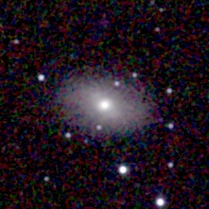astro.wikisort.org - Galaxy
NGC 7079 is a barred lenticular galaxy[2] located about 110.58 million light-years away[3] in the constellation of Grus.[4][5] NGC 7079 is also classified as a LINER galaxy.[3][5] It is tilted about 51° to the Earth's line of sight.[2] NGC 7079 was discovered by astronomer John Herschel on September 6, 1834.[4]
| NGC 7079 | |
|---|---|
 Barred lenticular galaxy NGC 7079. | |
| Observation data (J2000 epoch) | |
| Constellation | Grus |
| Right ascension | 21h 32m 35.2s[1] |
| Declination | −44° 04′ 03″[1] |
| Redshift | 0.00895[1] |
| Helio radial velocity | 2,684 km/s[1] |
| Distance | 110.6 Mly |
| Apparent magnitude (V) | 11.6[1] |
| Characteristics | |
| Type | SB0^0(s), LINER[1] |
| Apparent size (V) | 2.1 x 1.3'[1] |
| Other designations | |
| ESO 287-36, AM 2129-441, MCG -7-44-22, PGC 66934[1] | |
Physical characteristics
NGC 7079 has a faint cigar-shaped bar with ansae at the ends, and there is another very faint spiral structure surrounding it.[6][7] The rim of the disk also has a somewhat faint ring-like structure.[7]
Emission of doubly ionized oxygen gas
In NGC 7079, it has been indicated that there is a faint emission of doubly ionized oxygen. The ionized gas is rotating in the opposite direction of the stars in the galaxy. The counter-rotation has been attributed to the accretion of gas from outside of the galaxy.[2]
Group membership
NGC 7079 is a member of the NGC 7079 Group. The group, along with other nearby groups are part of the Pavo-Indus and Grus clouds of galaxies which form a connection between the Pavo–Indus and Virgo Superclusters. The other members of the NGC 7079 Group are NGC 7070, NGC 7070A, NGC 7097, NGC 7097A, ESO 287-37, ESO 287-39, ESO 287-41, and ESO 287-43.[8]
See also
References
- "NASA/IPAC Extragalactic Database". Results for NGC 7079. Retrieved 2017-07-18.
- Bettoni, D.; Galletta, G. (1997). "A survey of the stellar rotation in barred galaxies" (PDF). Astronomy and Astrophysics Supplement Series. 124: 61–74. Bibcode:1997A&AS..124...61B. doi:10.1051/aas:1997180.
- Marino, A.; Rampazzo, R.; Bianchi, L.; Annibali, F.; Bressan, A.; Buson, L.M.; Clemens, M. S.; Panuzzo, P.; Zeilinger, W. W. (9 September 2010). "Nearby early-type galaxies with ionized gas: the UV emission from GALEX observations" (PDF). Monthly Notices of the Royal Astronomical Society. 411: 311–331. arXiv:1009.1931. Bibcode:2011MNRAS.411..311M. doi:10.1111/j.1365-2966.2010.17684.x. S2CID 119204455.
- "New General Catalog Objects: NGC 7050 - 7099". cseligman.com. Retrieved 2017-07-01.
- "Your NED Search Results". ned.ipac.caltech.edu. Retrieved 2017-07-20.
- "Detailed Object Classifications". ned.ipac.caltech.edu. Retrieved 2017-07-20.
- "NGC 7079 - (RL)SB(s)0o".
- Fouque, P.; Proust, D.; Quintana, H.; Ramirez, A. (30 September 1993). "Dynamics of the Pavo-Indus and Grus clouds of galaxies" (PDF). Astronomy and Astrophysics Supplement Series. 100: 493–500. Bibcode:1993A&AS..100..493F.
External links
- NGC 7079 on WikiSky: DSS2, SDSS, GALEX, IRAS, Hydrogen α, X-Ray, Astrophoto, Sky Map, Articles and images
На других языках
[de] NGC 7079
NGC 7079 ist eine Linsenförmige Galaxie mit aktivem Galaxienkern vom Hubble-Typ SB0 im Sternbild Kranich am Südsternhimmel. Sie ist schätzungsweise 119 Millionen Lichtjahre von der Milchstraße entfernt und hat einen Durchmesser von etwa 70.000 Lichtjahren.- [en] NGC 7079
[ru] NGC 7079
NGC 7079 (другие обозначения — PGC 66934, ESO 287-36, MCG -7-44-22, AM 2129-441) — линзообразная галактика (SB0) в созвездии Журавль.Другой контент может иметь иную лицензию. Перед использованием материалов сайта WikiSort.org внимательно изучите правила лицензирования конкретных элементов наполнения сайта.
WikiSort.org - проект по пересортировке и дополнению контента Википедии